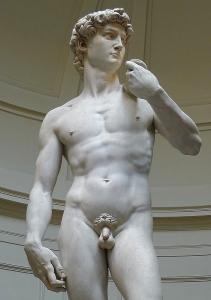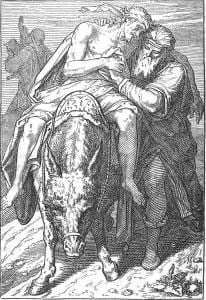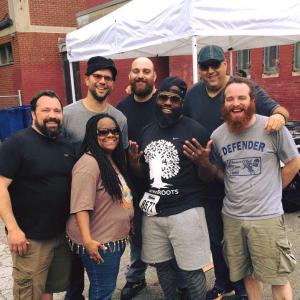 The Bible’s stories are riddled with sharp questions and often peculiar and twisted answers. When YHWH asks the hidden ‘adam, lurking among the trees of the garden, scratching in those hilarious fig-leaf aprons, “Where are you?”, the reply is loquacious and devious: “I heard your sound in the garden; I was afraid and naked. I hid myself.” A most unusual answer to a very simple question! In the very next chapter of the story, YHWH’s question to Cain, standing in the field with a stone or ax or shovel in hand, “Where is your brother?” elicits this reply: “I don’t know. Am I that monkey’s trainer?” or something like that, reading the famous verb “keeper” as one might a worker in a zoo. “Am I my brother’s keeper?” has become all too sweet for the apparent intent of the murderer’s retort.
The Bible’s stories are riddled with sharp questions and often peculiar and twisted answers. When YHWH asks the hidden ‘adam, lurking among the trees of the garden, scratching in those hilarious fig-leaf aprons, “Where are you?”, the reply is loquacious and devious: “I heard your sound in the garden; I was afraid and naked. I hid myself.” A most unusual answer to a very simple question! In the very next chapter of the story, YHWH’s question to Cain, standing in the field with a stone or ax or shovel in hand, “Where is your brother?” elicits this reply: “I don’t know. Am I that monkey’s trainer?” or something like that, reading the famous verb “keeper” as one might a worker in a zoo. “Am I my brother’s keeper?” has become all too sweet for the apparent intent of the murderer’s retort.
Sharp questions and half-baked answers have marked white persons’ engagements with African-Americans over the 400 years since the two of them have inhabited this continent; African-Americans have asked the white majority again and again, “How long?” and “When will you treat as human beings?” and “When will you quit talking long enough so that you might actually hear what we are saying?” Since the large protests sparked by the very public murder of George Floyd by a Minneapolis police officer, adding to a role call of infamy of too many other cases of black deaths at the hands of white police, I have said again and again that I am a racist, that I participate in and profit mightily from the systemic racism that characterizes the US structures of society. There can be no denying that fact, however much I wish it were not so. We whites have regularly and continually answered those anguished questions noted above by saying, “Slow down!” and “We are making progress; you just have to have patience!” and “We will listen to you as long as you speak to us in measured and careful tones!” “No shouting, please!” “And for sure no rioting!” The current very white president of the USA has joined this tired and painful chorus by calling himself the law and order president, and warns that if Democrats take over the country, chaos will rule the streets; no one will be safe, as immigrants and blacks run rampant through the land. It is the lowest (or highest) dog whistle he knows, and he hopes all his angriest followers hear the call and vote him in for another term.
My wife and I have begun to read a very engaging and challenging book together, White Fragility, by Robin DiAngelo, a 2018 small tome with the subtitle, “Why It’s So Hard for White People to Talk About Racism.” And she should know. She is white and has conducted hundreds of workshops, primarily with white people, in industry and education, to try to do just that—talk about racism. Over and again she has found enormous pushback when she ventures to suggest that there is systemic racism in the USA, and that white people, still the powerful majority in the country, profit enormously from its continuance. Many white people do not believe that and do not want to hear it. Even in rooms of fifty people, where 48 are white, the anger and loud protests from many of those whites fill the air. Most simply cannot and will not admit that they are even the slightest bit racist. And so she writes this book to try to understand why that is so.
Early in her book, she announces that we whites are especially ignorant and ill- informed about our racism because we have not in our educations and socializations learned much if anything about it. This is true for two basic realities: individualism and objectivity, “two key Western ideologies,” as she names them. The former, a key trait of the first white settlers of what became the USA, tells us that we are each one unique and stand apart from all others, even from those within our chosen social groups. And objectivity claims that it is in reality possible to be free of all bias. If I see myself as a unique and completely free individual, able to make all decisions about my life completely free from bias, it becomes very difficult if not impossible to “explore the collective aspects of the white experience,” as she puts it. In short, I cannot be a racist, because that would imply that I have a bias in my thinking against persons of color, something that is plainly not true because I in fact carry no biases, and because I am a unique individual, no one can determine for me how I should live my life. That would be tyranny, and America is the purest of democracies, bidding all citizens to make of their lives what they will. This also means that if one person is not as successful as another in life, the problem may be found in the will and desire of each person, not in the collective reality of race and class. All are equal, are they not? So, inequality results from poor choices or laziness, not from an imbalanced playing field.
With this in the background of my white appropriation of the Bible, two more texts spring to mind that suggest that reading the Bible with the eyes of white privilege does not allow me to hear the full range of possibilities of a richer and more challenging reading. The first is the justly famous 2 Samuel 12 that offers to us the short story that Nathan the prophet recites to King David, directly after the king has broken four of the Ten Commandments in his tawdry affair with Bathsheba. Nathan tells of a poor man and his beloved ewe lamb, whom he dotes on and treats as a human child, and of a rich man who plans a dinner party for a friend and decides to slaughter and serve the poor man’s lamb for his meal, even though he has vast flocks of his own. Nathan does not need to ask the king the question of what should be done to this heartless thief; David shouts out that “he deserves to die; he shall restore the lamb fourfold, because he did this thing without pity” (2 Sam.12:5-6). It sounds a garbled reply, since if the man is killed for the deed, he will have a very difficult time restoring the lamb, but David is clearly furious at the obvious injustice. Nathan then points a withering finger at the angry king, and thunders, “You are the man!” And so he is. But the church has for too long only heard this story as one about individual wrongdoing. Early on in the use of the story, some commentator connected the words of Ps.51 to David’s involvement by adding a superscription to the psalm, expressly noting that David prayed thus “after he had gone into Bathsheba.” The psalm is an individual lament, and has served the church as such ever since, this psalm becoming the parade example of an individualized piety.
Yet, it need not be heard only that way. After all, the story enshrines in its details the stark reality of societal injustice, a place where the rich may without deterrence steal the one lamb of the poor, a society that is so structured as to make inequalities obvious and constant. The problem is not only an individual one where one powerful man demands justice; the problem is far deeper in that inequalities are sewn into the culture, inequalities that go far beyond one person’s need for rebuke and change. In fact, it could readily be said that David’s supposed admittance of his sins with Bathsheba and her husband Uriah have little long term effect, since even on his death bed he is calling down dark vengeance on a helpless old enemy (1 Kings 2:9). We each need individual repentance, but that must not blind us to the structures of our world that privilege us at the expense of others.
The second text is the very familiar tale of the Good Samaritan from Luke 10. Here is the classic story of individual help from an unlikely source. Indeed, the unnamed Samaritan has become the model of what we individual Christians are called to do when faced with hurting people, even those who may be strangers to us. All well and good, but again there is a deeper concern with the society that spawned the story. Samaritans, those believers who worshipped only on Mount Gerizim in the far north of Israel, who were the offspring of the mixing of Assyrian conquerors and northern Israelites over the previous 700 years, were simply not to be seen as viable members of the true Israelite society in the 1st century CE, the time of Jesus. They were avoided and denigrated and made invisible by the traditional Israelite majority. For Jesus to tell a tale about a “good Samaritan” was to do nothing less than fling Israelite prejudice into their faces. As both priest and Levite pass by the half-dead man in the ditch, for no given reasons, the Samaritan proves the true follower by offering unstinting aid. We note that when Jesus asks the Israelite lawyer which one of the three characters of the story “proved to be neighbor,” the stunned lawyer cannot even say the word Samaritan, but can only stammer “the one who showed mercy.” Again we hear a sharp question and a not quite direct reply.
And how about we white people in the face of the agony and rejection and oppression of our African-American brothers and sisters? They continue to ask us questions and we continue to answer too briefly, too comfortably, too blithely, displaying our ignorance, our privilege, our unwillingness genuinely to listen to the full content of the questions being asked. Is it not far past time to listen? Is it not far past time to listen and then reply, and not with defensiveness but with empathy, not with satisfied comfort but with a tension-filled and tentative voice, always asking whether the questioner has been heard fully? I commend DiAngelo’s book to you, and urge you not to allow this fraught moment in our history to be missed one more time, but to engage yourselves completely in the needed discussions, finally to make progress toward the promise of the founding claim for “life, liberty, and the pursuit of happiness” for all, not just for some.
(Images from Wikimedia Commons)











